These days, clients expect their accountants to offer a seamless, digital experience. No one wants to dig through old emails to find last year’s tax return or request the same financial statement multiple times. A client portal eliminates this frustration by providing a centralized, secure space for document sharing, file storage, and client communication.
Beyond convenience, a well-designed accounting client portal enhances customer service by making financial data easily accessible while ensuring security and compliance. And for accountants, it reduces the back-and-forth, saving valuable time during tax season and beyond.
But with so many options available, how do you choose the right one? In this guide, we’ll break down the key features accountants should look for and compare 10 of the best client portals in 2025 to help you make the right choice.
What are Client Portals?
A client portal is a secure online platform where accounting firms and their clients can exchange documents, messages, and other sensitive information. Instead of relying on email, which can be inefficient and insecure, a client portal software serves as a dedicated hub for file sharing and workflow management.
For accountants, this means having a single place to manage client communication, document management, and approvals. Many portals also automate repetitive tasks, send notifications and reminders, and offer tools for client onboarding.
For clients, a secure client portal provides 24/7 access to tax returns, invoices, and financial statements. It also allows them to collaborate with their accountant more efficiently, eliminating the frustration of searching emails for lost attachments.
Why Accountants Should Use a Client Portal
A client portal isn’t just a convenience—it’s becoming a necessity for modern accounting firms. Here’s why:
- Improved efficiency – No more lost emails or repetitive document requests. Everything is stored in one place for easy access.
- Better client experience – Clients appreciate being able to login and find what they need without waiting for a response.
- Enhanced security – Sensitive financial documents are stored and shared securely, reducing the risk of data breaches.
- e-signature capabilities – Many portals allow clients to sign documents electronically, speeding up approvals and reducing paperwork.
- Compliance with regulations – Secure portals use encryption and access controls to help accounting firms meet industry standards for data privacy.
- Seamless client onboarding – A good portal simplifies the process of collecting initial financial documents and setting up recurring workflows for new clients.
How Client Portals Improve Workflow
A well-designed accounting client portal helps accountants streamline their workflow by automating repetitive tasks and providing tools for better team and client collaboration. Here are some key ways portals improve efficiency:
- Automated reminders and notifications – Many portals send automatic alerts when a document needs to be signed, a task is due, or a file has been uploaded.
- Task tracking and workflow management – Built-in task lists ensure accountants never miss deadlines, and team members can track progress in real time.
- Customizable dashboards – Some portals allow firms to customize the interface, prioritizing key tasks and reports.
- Seamless integration with accounting software – The best portals sync with tax preparation and bookkeeping tools, reducing the need for manual data entry.
By using a secure client portal, accountants can collaborate with their team and clients more effectively, ensuring smooth operations throughout the year.
What Client Portal Features Should Accountants Look For?
When evaluating client portals, accountants should prioritize features that improve document management, workflow automation, and client communication. Here are key features to look for:
- Tax organizer with prefilled answers – A portal should allow clients to complete tax organizers efficiently, with the ability to prefill answers from previous years and save static variables for future use.
- Secure document storage and file sharing – Look for portals with encrypted document management, permission controls, and easy file organization.
- e-signature integration – Clients should be able to sign engagement letters, tax documents, and other forms directly within the portal.
- CRM-like functionality – A system that saves client details, recurring tasks, and important notes can streamline the workflow of an accounting firm.
- Task management and automation – Built-in task lists help accountants track deadlines and ensure all client work is completed on time.
- Custom branding and white-labeling – The ability to customize the portal with your firm’s logo and domain name enhances professionalism.
- Integration with accounting software – A good portal should connect with tax software, bookkeeping platforms, and document management systems.
- Encrypted login and multi-factor authentication – Security features ensure that only authorized users can access sensitive files.
Top 10 Client Portals for Accountants
Here’s an in-depth look at the 10 best client portals for accountants in 2025, each evaluated for its strengths in security, organization, and efficiency:
1. Ahsuite
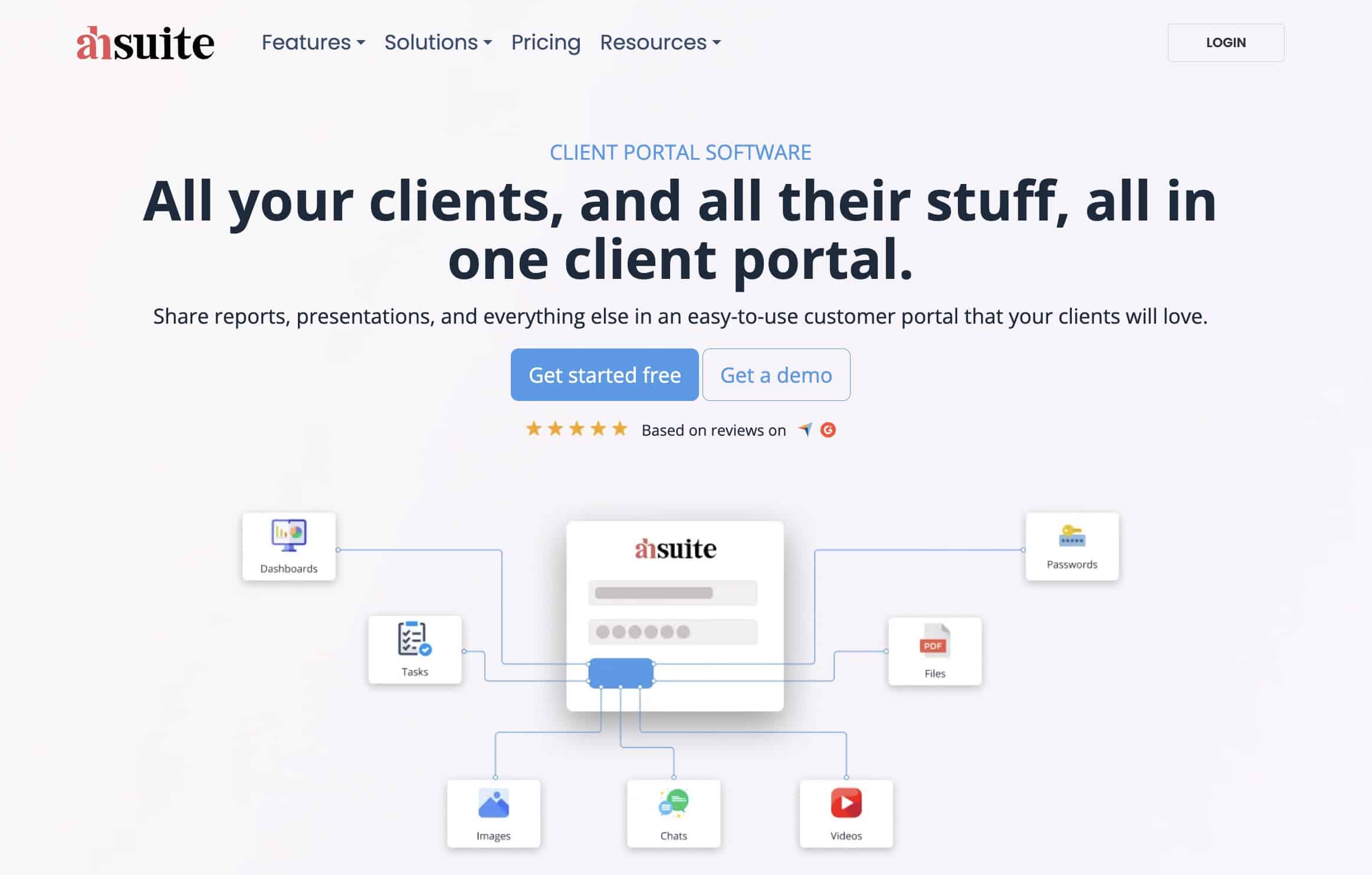
Ahsuite is a versatile client portal platform designed to consolidate various client interaction tools into one space. It aims to provide agencies, freelancers, and service businesses (including accountants) with a professional, organized way to manage client tasks, share files, report progress, and store information securely.
Key Features:
- Secure client portals with custom branding (white-labeling)
- File management with tagging and organization
- Task management (assignable to clients or team members)
- Password sharing vault
- Embedded reports (from tools like Google Data Studio)
- Client messaging
- Workflow automation capabilities.
Pros (Based on User Feedback):
- Users frequently praise its clean interface
- The convenience of having multiple tools integrated into one portal (file sharing, tasks, passwords)
- Strong white-labeling options for professional branding
- Responsive customer support
- The value for the price is often highlighted as a significant advantage.
Cons (Based on User Feedback):
- Some users have noted occasional minor bugs (though often quickly addressed)
- Requested more native integrations with specific third-party software
- Slight learning curve for utilizing all advanced features effectively
Learn more at Ahsuite
2. Canopy
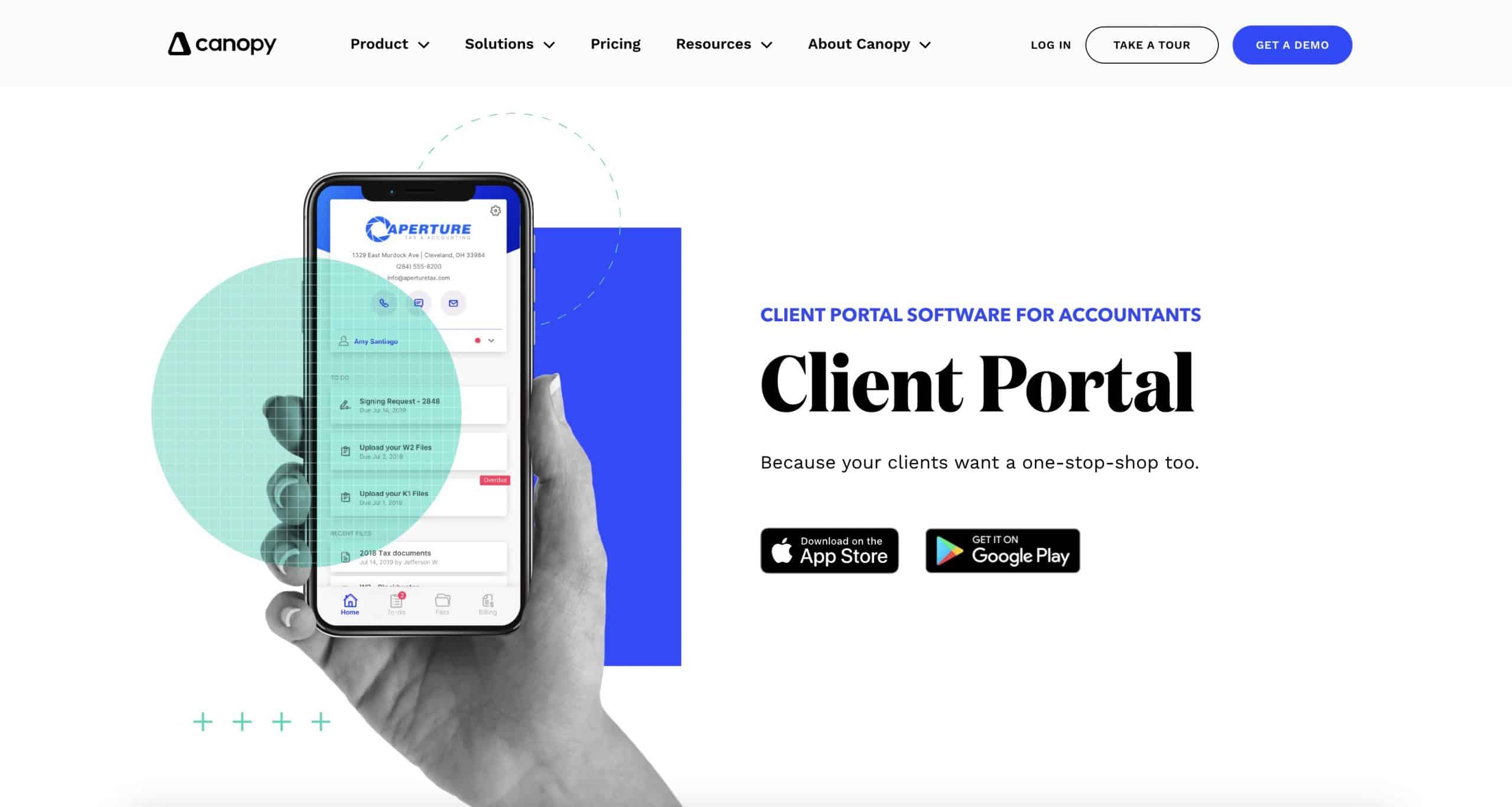
Canopy offers a comprehensive Practice Management suite built specifically for accounting firms. It goes beyond just a client portal to include tools for workflow, document management, time and billing, and client relationship management, aiming to be an all-encompassing operational hub.
Key Features:
- Secure client portal for document exchange and communication
- Robust document management system
- Workflow automation templates
- Task management
- CRM capabilities
- Time tracking and invoicing
- IRS transcripts tool
- Notices management
Pros (Based on User Feedback):
- Users often appreciate its focus on the accounting profession
- Seamless integration between its various modules (like documents, workflow, and client portal)
- Modern user interface
- Efficiency gains from automating workflows
- Transcripts and notices features are frequently cited as valuable
Cons (Based on User Feedback):
- Some users find Canopy to be on the higher end regarding pricing, especially for smaller firms
- Occasional mentions of system slowness or specific modules needing further development arise in reviews
- The breadth of features can also mean a steeper learning curve initially
Learn more at Canopy
3. Citrix ShareFile
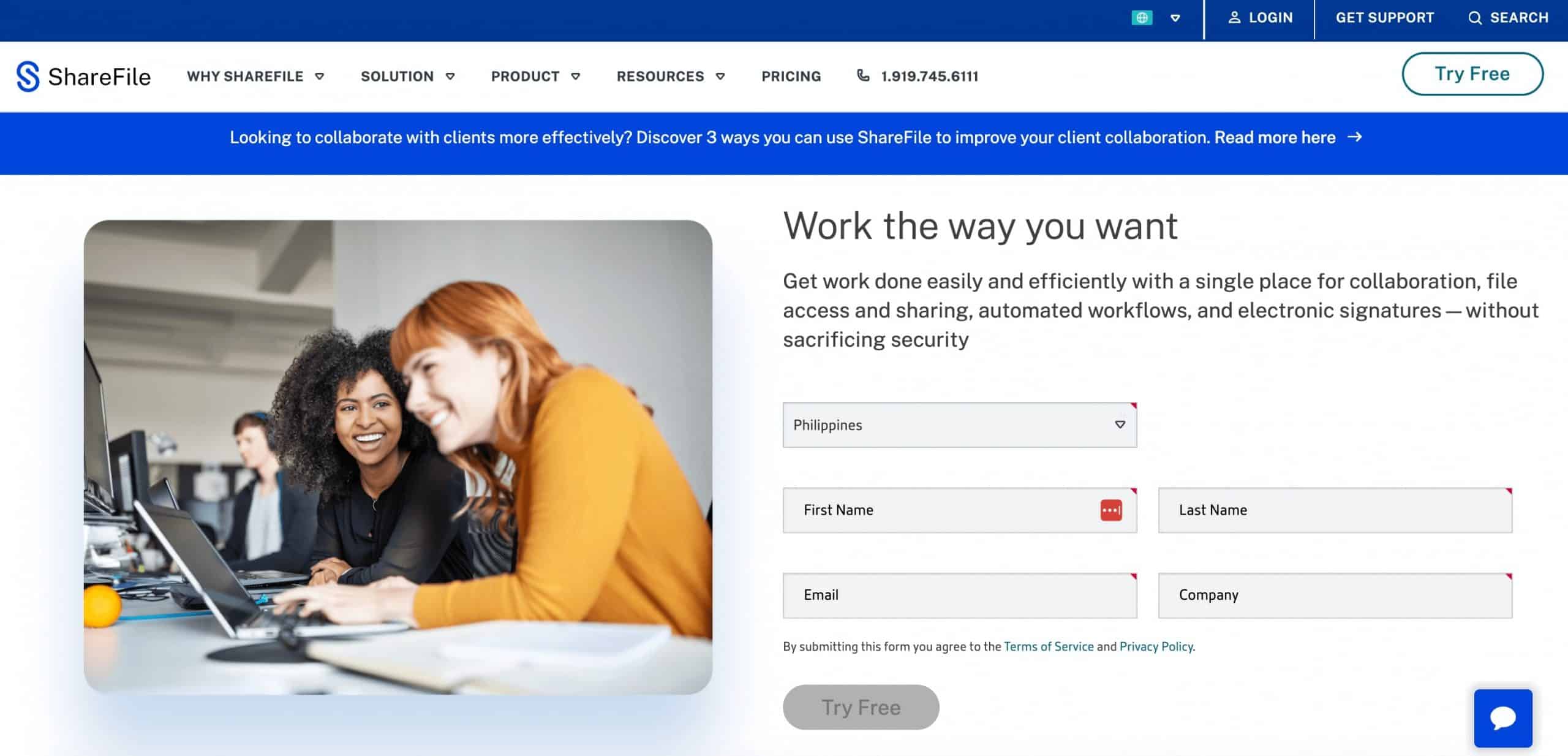
ShareFile, now part of the Cloud Software Group (following Citrix’s merger), is a long-standing, enterprise-grade solution focused on secure file sharing, storage, and collaboration. It prioritizes security and compliance, making it popular among businesses handling sensitive data, including accounting firms.
Key Features:
- Secure file sharing with granular permissions and link settings
- Large file transfer capabilities
- Bank-level encryption (in transit and at rest)
- e-signatures integration
- Custom-branded client portals
- Workflow automation (e.g., document approvals)
- Detailed audit trails
- Support for compliance requirements (like HIPAA)
Pros (Based on User Feedback):
- Its robust security features and reliability are consistently praised
- Users value the granular control over file access
- Ease of sending large files securely
- Strong integrations (especially with Microsoft Outlook)
- Established reputation for compliance
Cons (Based on User Feedback):
- ShareFile can be more expensive compared to some newer or less feature-rich competitors
- Some users find the user interface less modern or intuitive than others
- For firms needing only basic portal features, it might offer more complexity than necessary
4. Karbon
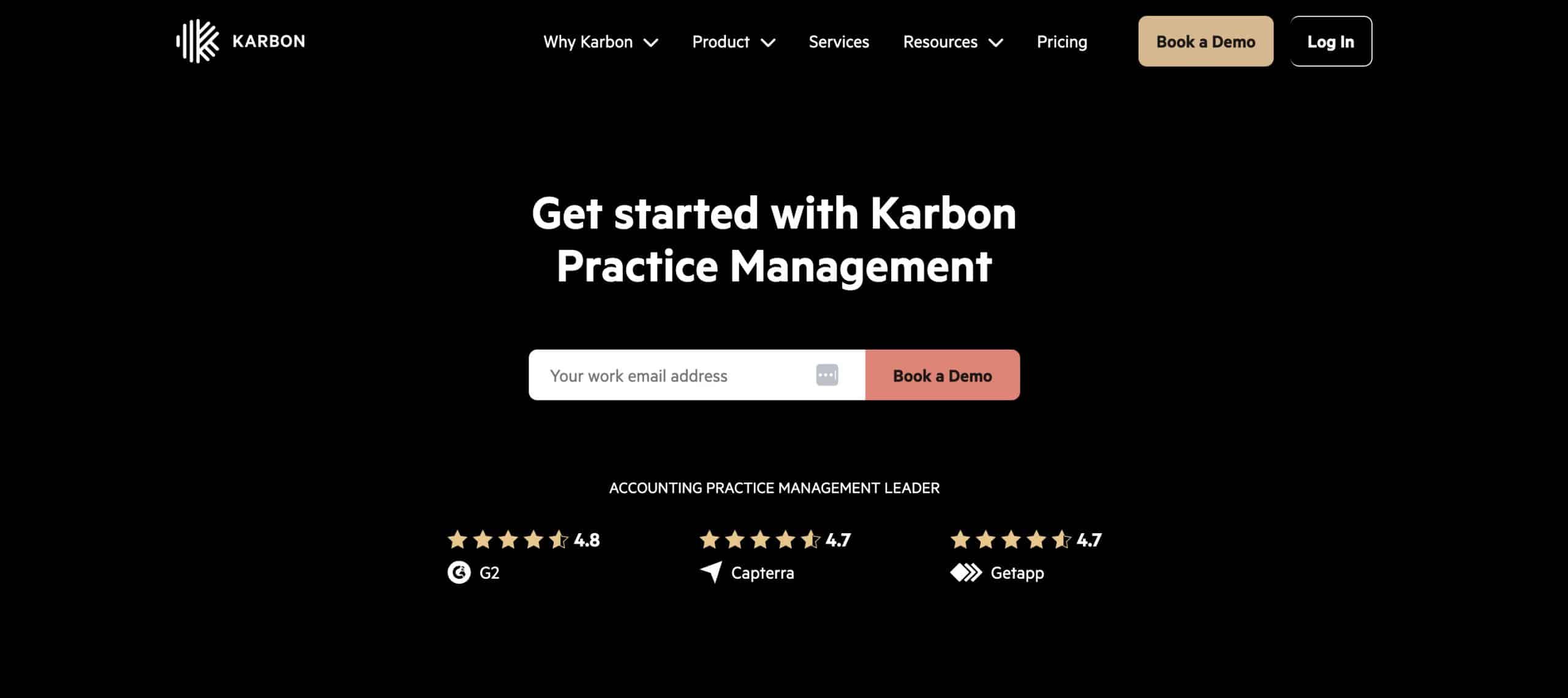
Karbon is a collaborative practice management platform designed for accounting firms, emphasizing workflow automation, internal team communication, and visibility across client work. It acts as a central hub for managing tasks, emails, clients, and internal discussions related to accounting engagements.
Key Features:
- Centralized communication (email triage)
- Workflow automation with templates and recurring tasks
- Internal collaboration tools (comments, @mentions)
- Client management database
- Task management across teams
- Time tracking and budgeting capabilities
- Integrations with other accounting tools.
While it has document storage, it’s often used alongside dedicated document management systems.
Pros (Based on User Feedback):
- Users highly rate its workflow automation capabilities for streamlining processes
- Triage feature for managing team email effectively
- Enhanced team visibility and collaboration
- Excellent customer support
- It’s often praised for improving firm efficiency and organization
Cons (Based on User Feedback):
- Karbon is considered a premium-priced product
- There can be a significant learning curve due to its comprehensive nature
- Some users desire deeper native features in areas like billing or more robust built-in document management compared to specialized tools
Learn more at Karbon
5. SmartVault
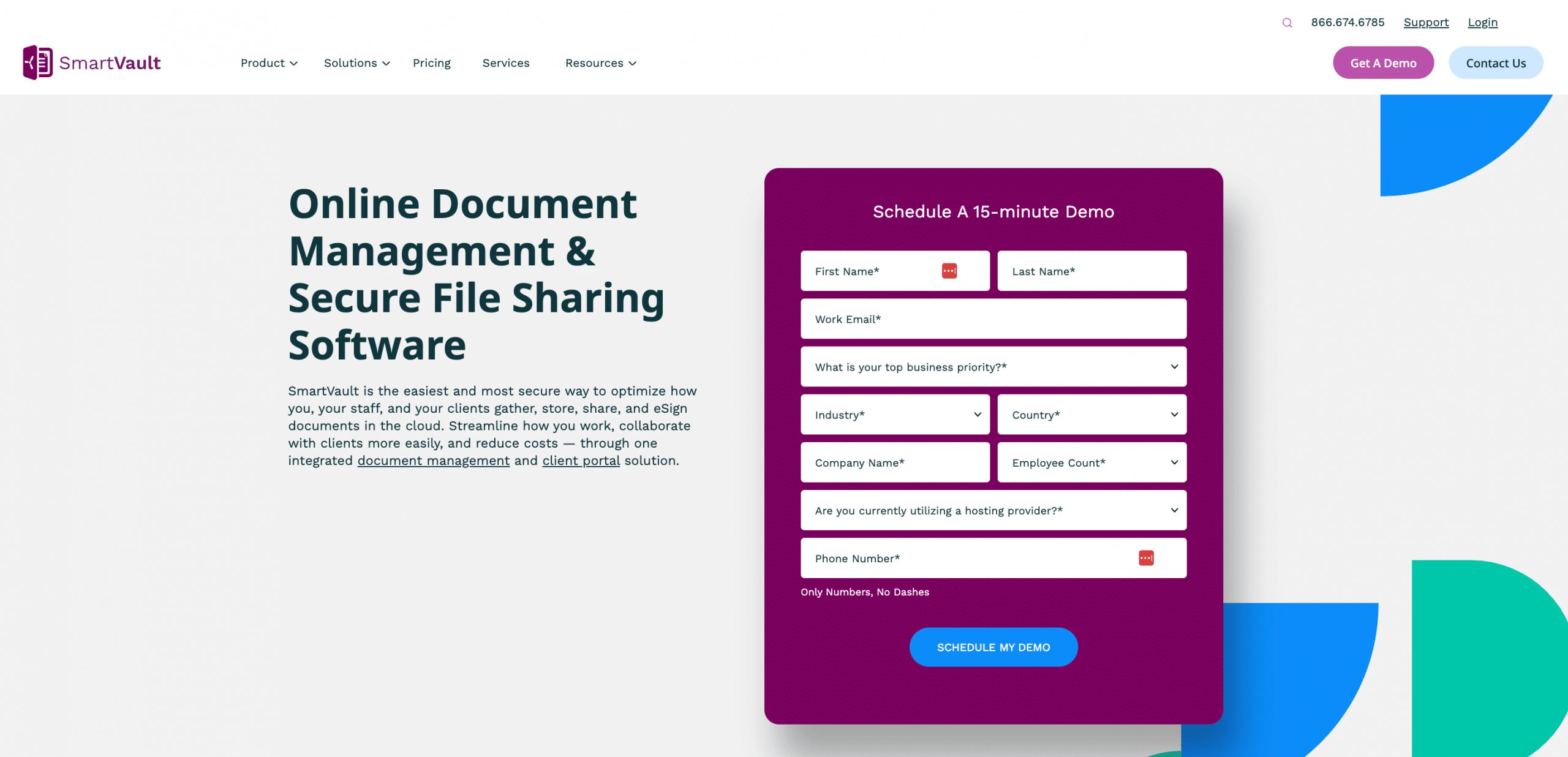
SmartVault provides secure cloud-based document management and client portal solutions, specifically tailored for accountants and businesses. It’s well-known for its deep integrations with Intuit QuickBooks and tax software like Lacerte and ProSeries.
Key Features:
- Secure online document storage with granular folder permissions
- Custom-branded client portal for easy file exchange
- Integrated e-signatures (often via DocuSign)
- Direct scanning to the cloud (Connected Desktop tool)
- Activity logs and audit trails
- Strong integrations with key accounting ecosystem software.
Pros (Based on User Feedback):
- Users value its strong security posture, reliability for document storage, and particularly its seamless integrations with QuickBooks and popular tax software, which significantly streamlines workflows
- Ease of client use for uploading/downloading documents is also frequently mentioned
Cons (Based on User Feedback):
- Some users find the user interface looks a bit dated compared to newer platforms
- While integrations are a strength, some wish for more built-in functionalities rather than relying on third-party integrations for things like e-signatures in some plans
- The pricing structure has occasionally been cited as complex by some users
Learn more at SmartVault
6. Client Hub
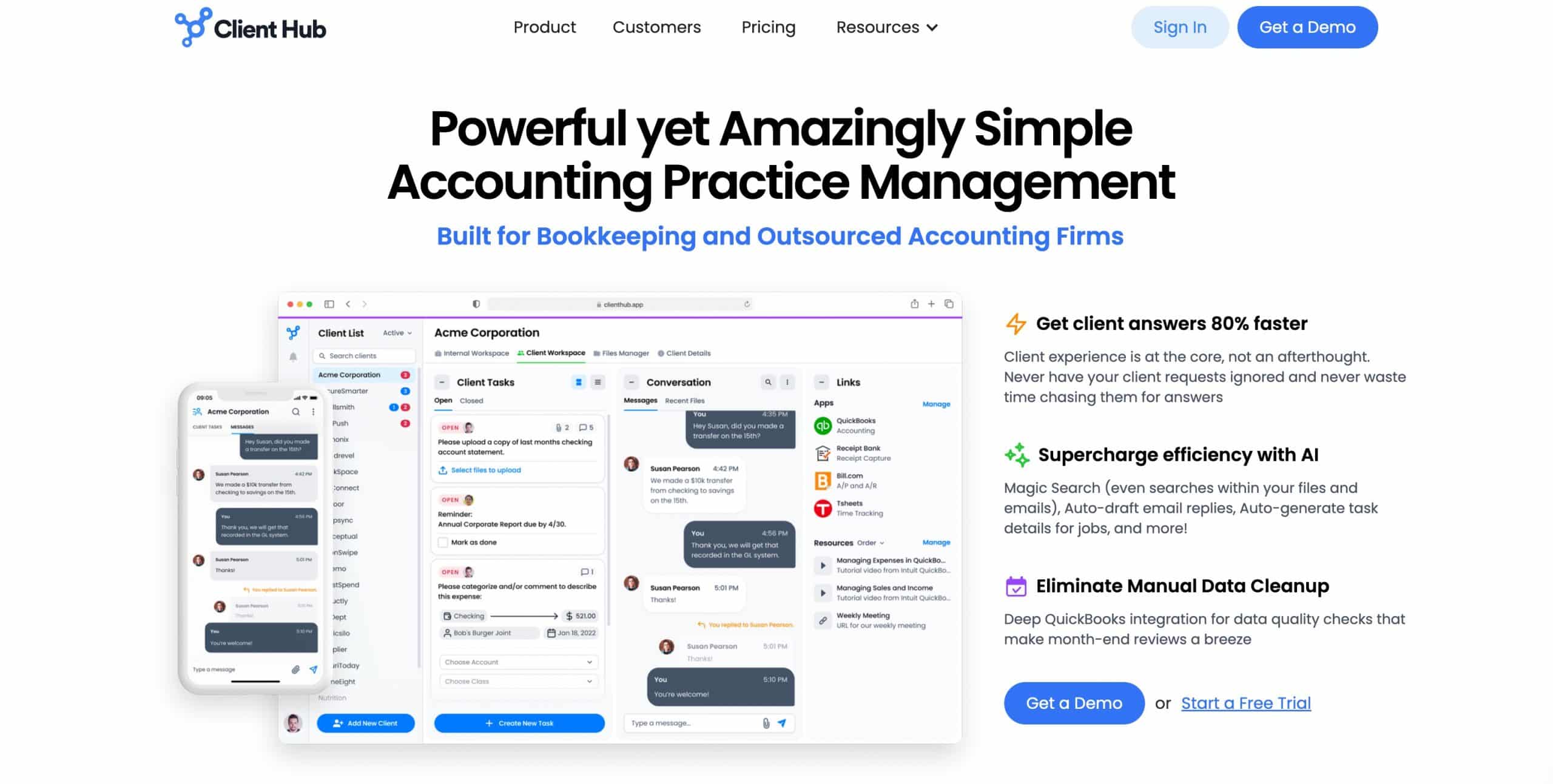
Client Hub focuses on improving communication and workflow between accounting/bookkeeping firms and their clients. It provides a shared workspace designed to centralize requests, file sharing, and messaging, reducing reliance on scattered email threads.
Key Features:
- Unified client workspace including secure messagin
- File sharing and storage
- Client task management (assigning tasks to clients)
- Workflow templates for recurring jobs
- Integration with accounting software (like QBO, Xero)
- Mobile app access.
Pros (Based on User Feedback):
- Users praise its effectiveness in centralizing client communication and managing client tasks/requests efficiently
- The clean, user-friendly interface for both the firm and the client is often highlighted
- It’s seen as a great tool for reducing email clutter and keeping client interactions organized
Cons (Based on User Feedback):
- As it’s more focused on the client communication/interaction layer, it may lack the depth of features found in full practice management suites (e.g., complex internal workflow automation, time/billing)
- Some users have requested more advanced customization options or deeper workflow capabilities
Learn more at Client Hub
7. TaxDome

TaxDome is an all-in-one practice management software built specifically for tax professionals and accounting firms. It aims to provide a comprehensive suite of tools, including CRM, workflow, document management, billing, and a client portal, under one subscription.
Key Features:
- Secure client portal with mobile app
- CRM with custom fields
- Workflow automation (pipelines, jobs, tasks)
- Secure document management with e-signatures, client messaging, organizers (custom questionnaires), invoicing and online payments (via integrations like Stripe, CPACharge), and website integration options
Pros (Based on User Feedback):
- The “all-in-one” nature and affordability are major selling points frequently mentioned in reviews
- Users appreciate the breadth of features included for the price, the active development cycle with frequent updates, and the level of customization available in areas like organizers and pipelines
Cons (Based on User Feedback):
- The sheer number of features can be overwhelming initially, leading to a steeper learning curve
- Some users report encountering occasional bugs or wishing for more polish in specific modules
- While support is generally available, response times have sometimes been mentioned as an area for improvement during peak seasons
Learn more at TaxDome
8. Content Snare
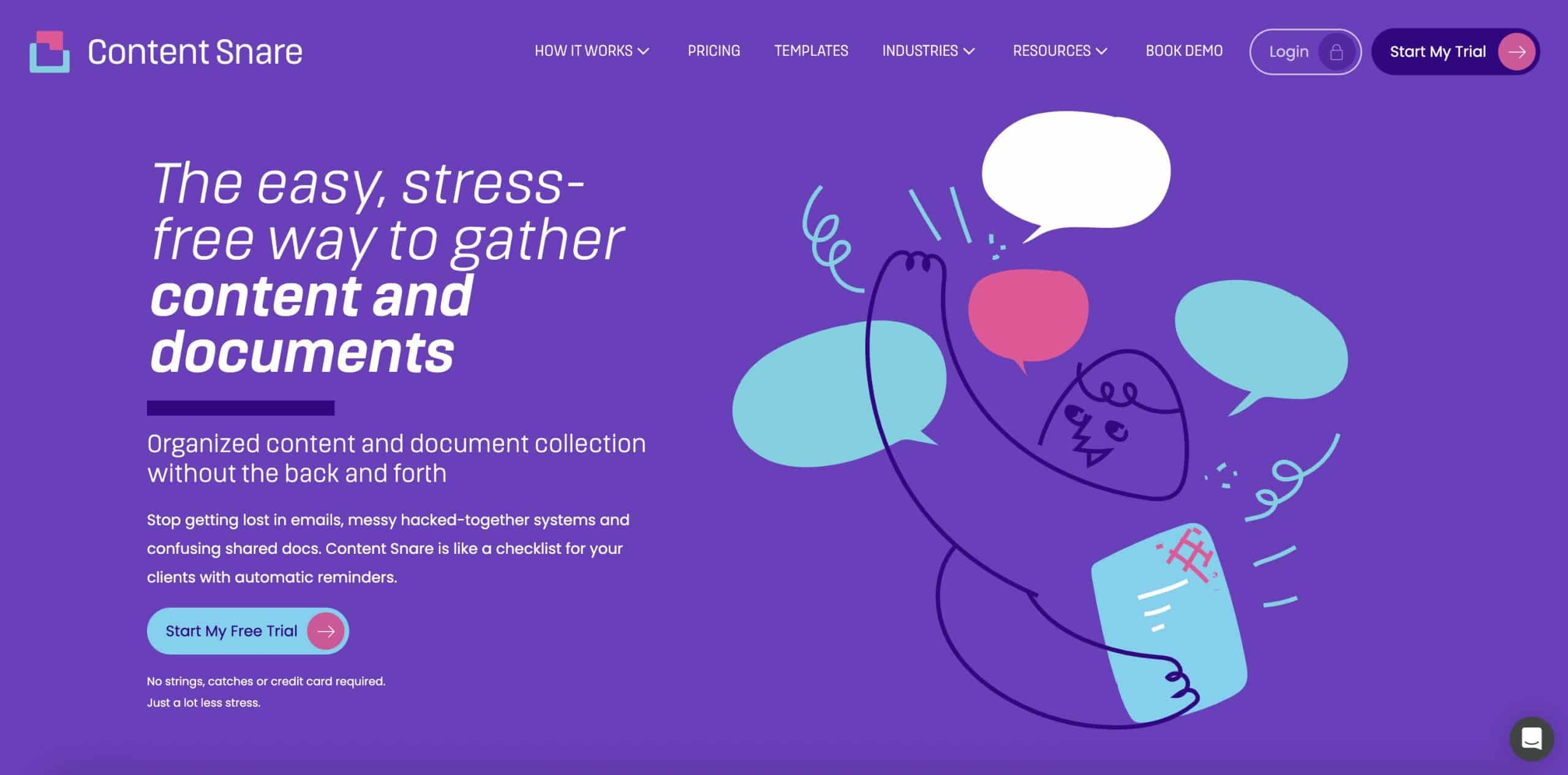
Content Snare is a specialized tool designed to streamline and automate the process of collecting information and documents from clients. It’s particularly useful for accountants during client onboarding, tax preparation, or any process requiring significant client input.
Key Features:
- Customizable request templates for information and documents
- Automated reminders for clients
- Simple client-facing interface for uploading files and answering questions
- Progress tracking for requests
- Conditional logic in questions
- Secure environment for data collection.
Pros (Based on User Feedback):
- Users consistently praise its effectiveness in drastically reducing the time spent chasing clients for information
- The automated reminders are highly valued
- It’s considered easy for clients to use, leading to faster turnaround times and less frustration for both the firm and the client
Cons (Based on User Feedback):
- Its primary focus is information collection; it’s not a full client portal for ongoing communication or extensive document storage unrelated to specific requests
- The pricing model, often based on the number of active requests, might require careful consideration depending on the firm’s usage patterns
Learn more at ContentSnare
9. Onehub
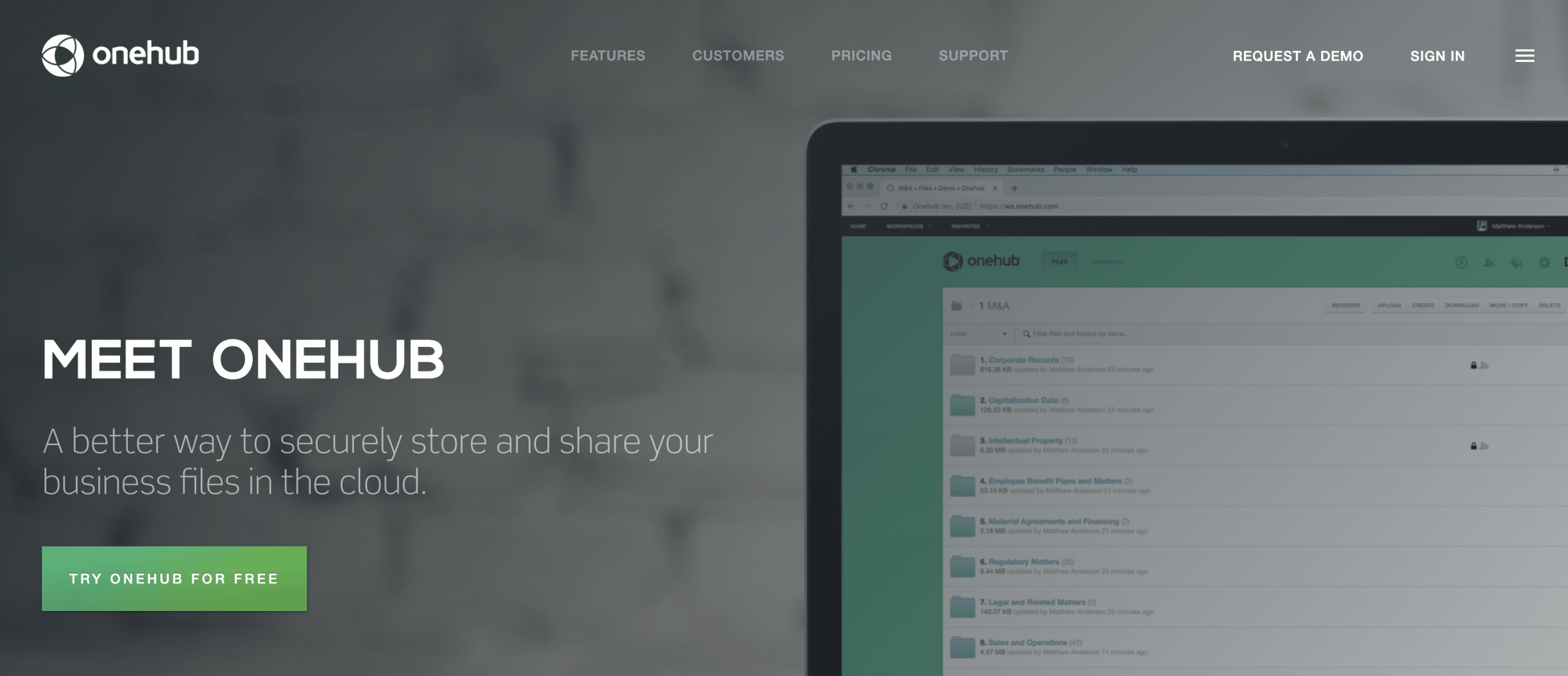
Onehub is a cloud-based solution for businesses focused on secure file storage, sharing, and collaboration, often used to create custom-branded portals. It emphasizes control over data access and provides features useful for creating secure client portals or virtual data rooms (VDRs).
Key Features:
- Secure cloud storage with robust permission controls (role-based access)
- Custom-branded workspaces (client portals)
- Secure file sharing via links with advanced options (passwords, expiration)
- Activity tracking and audit trails, large file uploads, and virtual data room capabilities
Pros (Based on User Feedback):
- Users often highlight the strong security features and granular permission controls, which are crucial for handling sensitive financial data
- The ability to customize portals with branding and the ease of securely sharing files with clients and third parties are frequently praised
- It’s often considered relatively easy to set up and use for its core purpose
Cons (Based on User Feedback):
- Compared to platforms built specifically for accountants, it may lack deep, integrated accounting-specific workflow features
- Some users have found the user interface to be less modern or intuitive than some competitors
- Collaboration features might be less advanced than dedicated collaboration platforms
Learn more at Onehub
10. Huddle

Huddle is a document-centric collaboration platform often used by enterprises and government agencies that require high levels of security and control for internal and external collaboration. It facilitates secure file sharing, co-editing, task management, and approvals within a controlled environment.
Key Features:
- Secure client and partner portals (workspaces)
- Document management with version control and commenting
- Task management related to documents
- Approval workflows
- Detailed audit trails for compliance
- Integrations with Microsoft Office/365
- Strong security protocols
Pros (Based on User Feedback):
- Huddle is highly regarded for its security features, audit trails, and suitability for regulated industries or environments requiring strict compliance
- It facilitates secure collaboration with external parties effectively
- Version control and document-specific communication are often cited as strengths
Cons (Based on User Feedback):
- Huddle typically comes at a higher price point, often targeting larger organizations
- Some users find it can be overly complex for simple file sharing needs
- The user interface has occasionally been described as less intuitive compared to simpler, more modern tools by some reviewers
Learn more at Huddle
Summary
A client portal is more than just a convenience—it’s an essential tool for accountants who want to streamline workflow, improve client communication, and automate document management. The best portals help firms stay organized, enhance security, and collaborate more efficiently.
If you’re looking for a modern, affordable alternative to traditional client portals, Ahsuite is a standout choice. It’s loaded with integrations, offers a clean and intuitive interface, and can be customized on a white-labeled domain—giving your firm a professional experience.
Best of all, Ahsuite is free for up to ten portals, making it easy to try without any risk.
